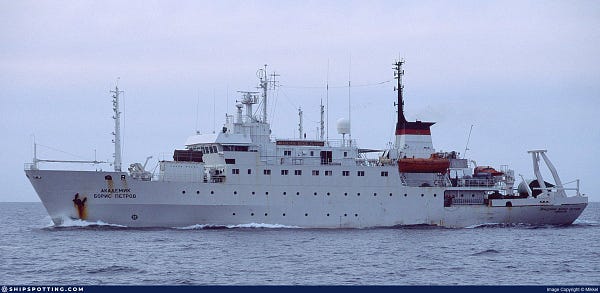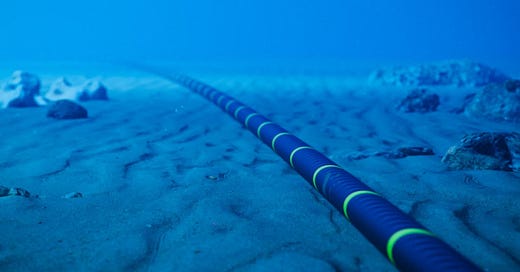When the Nord Stream gas pipelines were sabotaged, we here at AND Magazine pointed out that the most likely suspect had to be the United States. We also noted that if that were the case, we might well expect retaliation from Putin. We even speculated that Vlad might decide to attack undersea communications cables as part of his response.
It looks like that Russian response may have already begun.
The Shetland Islands lie off the coast of Scotland. They are part of the United Kingdom. Last week the Shetland Islands lost broadband and phone connectivity with the outside world when undersea communications cables to the island were cut. The cables were broken in two separate places on two separate occasions days apart.
Earlier this week large undersea internet cables in the south of France were cut. At least three fiber optic cables were cut in southern France on Wednesday evening. Search operations to identify damaged sections of the submarine cable are still ongoing.


And, now, the Royal Navy is tracking a Russian spy ship off the coast of the United Kingdom. The Russian vessel the Akademik Boris Petrov left its Kaliningrad on Monday, October 17, and set a course through the English Channel for supposed research activity in the South Atlantic. On Friday it changed course unexpectedly. This course will take it over multiple critical transatlantic cables off the coast of Ireland.
The cables over which the Akademik Boris Petrov will pass form the backbone of the World Wide Web. Ninety-five percent of the world’s communications travel on such undersea cables.




Taking down the World Wide Web does not just mean you can’t send email or watch your favorite cat videos. It means potentially that the whole world economy collapses. Companies can’t communicate. Stock exchanges can’t function. The entire banking system implodes.
In the financial sector alone, undersea cables carry some $10 trillion of financial transfers daily. European companies and banks are almost completely dependent on these cables because virtually all of their data is actually stored on servers in the United States.
We have talked about the threat to undersea cables for many years. It may now be becoming reality.
In addition to spy ships operating on the surface, the Russians maintain a sizeable number of submarines specifically dedicated to undersea special operations and sabotage. These include former ballistic missile subs, which have been enlarged and modified so as to be able to carry mini-submarines for use in undersea sabotage work. These min subs are carried to the target site. They then detach and go down to the sea floor to carry out whatever operation has been directed.
It has been known for many years that one of the specific operations such submarines can carry out would be attacks on undersea cables. There have also been countless incidents in which Russian subs have been found in proximity to undersea cables either emplacing what amount to taps on the lines or practicing for sabotage in the event of war.
It turns out that in war when you take action there are consequences. When you invade Afghanistan, topple the Taliban, and then decide on a whim to take on the task of nation-building and trying to change an entire culture you find yourself face to face with a nationwide insurgency and a religious jihad.
When you invade Iraq, topple Saddam, and then decide to fire the entire military and all the security services you discover that you just unleashed 1500-year-old religious and ethnic animosities and started a firestorm.
And, when you decide to pour jet fuel on the fire that is the Russian-Ukrainian war, you back Putin into a corner and give him every motivation in the world to inflict pain on you for your decision. We ought to be making every effort to get the Russians and Ukrainians to the negotiating table and ending this war. We are not. We are stumbling forward, delighting in showing off our new weapons systems and the profits being enjoyed by powerful defense contractors.
We need to change course while we still can. Putin may be getting ready to take down the Internet, and it will only get worse from there.





Putin is not a good guy either, so what follows is not to imply that, nor to contradict that he may very well be responsible for the most recent (and immediate future?) cable cutting.
That said, we can no longer dismiss the possibility that "our" side might do it, and blame Putin. Creating such a catastrophic economic event (and shifting blame elsewhere) would be most useful for any or all of:
1) delaying the U.S. midterm elections;
2) collapsing the U.S. and European economies so as to create the rubble pile upon which to "build back better"
3) render citizens all over the Western nations abjectly poor, so that by 2030 they'll own nothing
4) provide cover for the (inevitable) collapse of the (over-printed) fiat currency known as the "U.S. dollar"
Agreed!